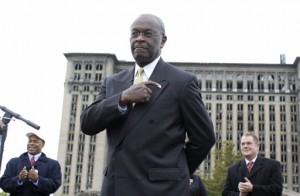 Jeffrey T. Kuhner
Jeffrey T. Kuhner
Herman Cain continues to soar in the polls. In some, he is leading the presumptive front-runner for the Republican presidential nomination, Mitt Romney. What accounts for Mr. Cain’s meteoric rise? He is the anti-Romney.
The media class despises Mr. Cain. The establishment GOP and some neoconservatives dismiss him as a lightweight. Both the liberal left and the Beltway right have settled on their preferred Republican nominee: Mr. Romney. The former Massachusetts governor is seen as the “responsible” choice. Mr. Romney is a brainy technocrat who is running on his pro-business experience.

He vows to control spending, streamline regulations and grow the economy. On social issues, especially abortion and homosexual rights, some don’t really believe Mr. Romney’s pro-life, pro-family conversion is genuine. He represents the moderate Northeastern wing of the GOP. Many Republicans believe he has the best chance of defeating President Obama in 2012. Yet it also explains the Cain phenomenon. Voters like him because he is someone who speaks his mind without calibrating every word.
Mr. Cain’s visceral appeal is that he is the outsider, the anti-establishment candidate. Unlike Mr. Romney, Mr. Cain is not a conventional politician. On the campaign trail, Mr. Cain’s answers are often not scripted; rather, they are blunt, raw and honest. He is articulate and passionate and uses simple, clear language that resonates with the electorate. In short, he is not a phony.
Moreover, he is a populist reformer who embodies much of the Tea Party insurgency against the decrepit governing class. Mr. Cain’s candidacy is tapping into Middle America’s frustration and anger with Imperial Washington. Politicians have brought America to the brink of collapse. Inside the Beltway, Mr. Cain’s lack of political experience is seen as a huge negative. In the heartland, however, it is viewed as a virtue.
Tax reform is Mr. Cain’s signature issue. His 9-9-9 plan is ambitious. The current tax code is burdensome, stifling and infested with special-interest loopholes and carve-outs. It is the very symbol of our bloated and corrupt federal government. Mr. Cain calls for a 9 percent income tax, a 9 percent business tax and a 9 percent national sales tax. His proposal creates a simple, efficient tax code that broadens the base of taxpayers.
It would unleash economic growth and job creation – and strike at the heart of welfare liberalism. Nearly half of all Americans no longer pay any income taxes. This means they are being subsidized by middle — and upper-income earners — one half of the country is living off the other half. Mr. Cain would end this. The 9-9-9 plan would terminate the use of the tax system to foster a culture of dependency and government handouts.
Mr. Cain’s worldview can be distilled to running America as a business, not a socialist empire. His call for across-the-board spending cuts, entitlement reform and repeal of Obamacare would revive our moribund market economy. None of the GOP candidates captures the entrepreneurial spirit better than Mr. Cain. He embodies rugged individualism and self-reliance. He is a self-made businessman and former chief executive officer of Godfather’s Pizza. He has spent almost his entire life in the private sector. He speaks with the weight of conviction — and experience.
Mr. Cain also truly represents the promise of a post-racial America. This was the initial appeal of Mr. Obama’s presidency: The ugly legacy of race finally would be buried. Instead, under his administration, the country has become even more racially — and ideologically — polarized. Mr. Obama and his media allies constantly play the race card to demonize their critics. Mr. Cain, however, is the very opposite: His campaign so far has been completely free of racial overtones or grievance-mongering. He is running on his character and policies, not on the color of his skin. His candidacy truly transcends race.
If Mr. Cain wins the nomination, he poses a mortal threat to the Democratic coalition. He can peel away one-third to a half of the black vote in 2012 — thereby shattering the Democrats’ base. He can bring black Americans back to the party of Lincoln. This would transform the political landscape, giving the GOP a permanent majority.
Like all the candidates, Mr. Cain has weaknesses. He has stumbled on abortion. He refuses to restore the ban on homosexuals in the military. His views on trade are sketchy. In particular, he has failed to articulate a comprehensive foreign policy. On Afghanistan, Iran, China and Russia, Mr. Cain needs to outline where he stands. This is especially true regarding the seminal issue of our time: radical Islam. If Mr. Cain can’t cross that bar, then he will rightfully lose the GOP primary contest.
Still, the insurgency of a candidate without much political experience shows that conservatives remain deeply skeptical of Mr. Romney. Like with Barry Goldwater in 1964, grass-roots Republicans are revolting against the Eastern establishment. Mr. Cain has many of Goldwater’s traits — the fire, the intensity, the passion and the willingness to challenge the GOP status quo. Goldwater was unlucky in that he ran in a year following the assassination of President Kennedy. The national outpouring of grief and sympathy made a Democratic victory inevitable. Yet this time, the country is in crisis and the Democrats are poised to be crushed in a landslide.
Mr. Cain’s rise stands as a stark warning to the GOP establishment: Tepid conservatives like Mr. Romney do not have the answers to the nation’s woes.
Jeffrey T. Kuhner is a radio talk show personality and a columnist at The Washington Times and WorldTribune.com.

You must be logged in to post a comment Login